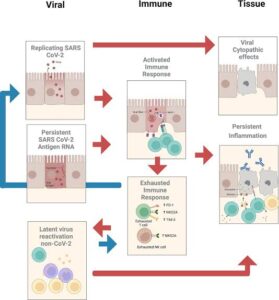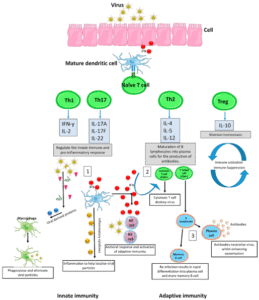Back to: MICROBIOLOGY 300 LEVEL
Welcome to class!
Hello brilliant one! I hope you’re feeling energised and ready to expand your understanding of how your body fights back when viruses try to invade. Just like a country has soldiers and a defence system to protect its people, your body has its own highly trained army—the immune system—ready to respond to any viral attack. Today, we’ll break it down together so it’s not only clear but very easy to remember and relate to.
Immune Response To Viral Infection
Have you ever had a fever, sore throat or body pain during an illness? That’s your body fighting back! When viruses enter the body, they try to take over your cells to make more copies of themselves. But your immune system doesn’t just sit there—it responds immediately and intelligently.

The immune response to viral infection is like Nigeria’s military forces: there are frontline soldiers who attack quickly (innate immunity), and then there are specialised forces who are trained to target specific enemies (adaptive immunity). These two parts work together to keep you healthy and strong.
Innate Immune Response: The First Line of Defence
The innate immune system acts fast—it’s your body’s emergency response team. It does not need to recognise the virus specifically before attacking.
Physical barriers like your skin and mucous membranes in the nose and mouth try to block viruses from entering.
If viruses sneak past, cells like macrophages, dendritic cells and natural killer (NK) cells take action.
These cells detect common features of viruses and begin destroying infected cells.
Cytokines (chemical messengers) are released to call more immune cells to the site of infection.
Interferons, especially Type I interferons, are released to warn nearby cells and limit viral spread.
Think of this as a neighbourhood vigilante group—they may not know who the thief is yet, but once something suspicious happens, they raise the alarm and start chasing intruders away.
Adaptive Immune Response: The Specialised Soldiers
While the innate system works fast, the adaptive system is more precise. It takes a few days to activate but provides long-term protection.
B cells produce antibodies that attach to the virus and block it from infecting cells. These antibodies can also tag the virus for destruction.
Helper T cells (CD4+) coordinate the immune response, releasing cytokines and helping B cells and other T cells to function better.
Cytotoxic T cells (CD8+) directly kill virus-infected cells.
After the infection, some B and T cells become memory cells—so if the same virus comes back, your body responds faster and stronger.
This is like the military’s intelligence unit—they study the enemy, create a file, and are ready to neutralise them quickly next time.
How the Body Clears Viruses
The combined efforts of innate and adaptive immunity lead to:
Neutralisation of viruses in the blood
Destruction of infected cells
Prevention of further infection
Formation of memory for future protection
Vaccines work by training this system without making you sick, so your immune system is ready if the real virus ever shows up.

Imagine a burglar tries to break into your house. First, your gate (skin) blocks them. If they get past, your guard dogs (macrophages and NK cells) start barking and attacking. Then your alarm system (cytokines and interferons) calls for help. The police (B and T cells) arrive later, arrest the burglar, and put his face in a wanted list (memory cells) so he can never sneak in again.
Summary
- The immune response protects the body from viral infections.
- Innate immunity acts fast but is not specific.
- Adaptive immunity is slower but highly specific and long-lasting.
- Key players include macrophages, NK cells, B cells, helper T cells, and cytotoxic T cells.
- The body forms immune memory for future protection against the same virus.
- Vaccines help prepare the immune system in advance.
Evaluation
- What is the main difference between innate and adaptive immunity?
- Name two cells involved in the innate immune response.
- How do cytotoxic T cells help in viral infections?
- What is the role of memory cells in viral infections?
- Why do vaccines work so effectively in preventing viral diseases?
You’ve just uncovered one of the most powerful systems in the human body—how incredible is that? Your immune system is your personal superhero squad, and now you understand how it works. Keep learning, keep growing, and remember: at Afrilearn, we believe in you. You are smart, capable, and becoming a true scientist of tomorrow. Let’s keep going strong—on to the next adventure in learning!
